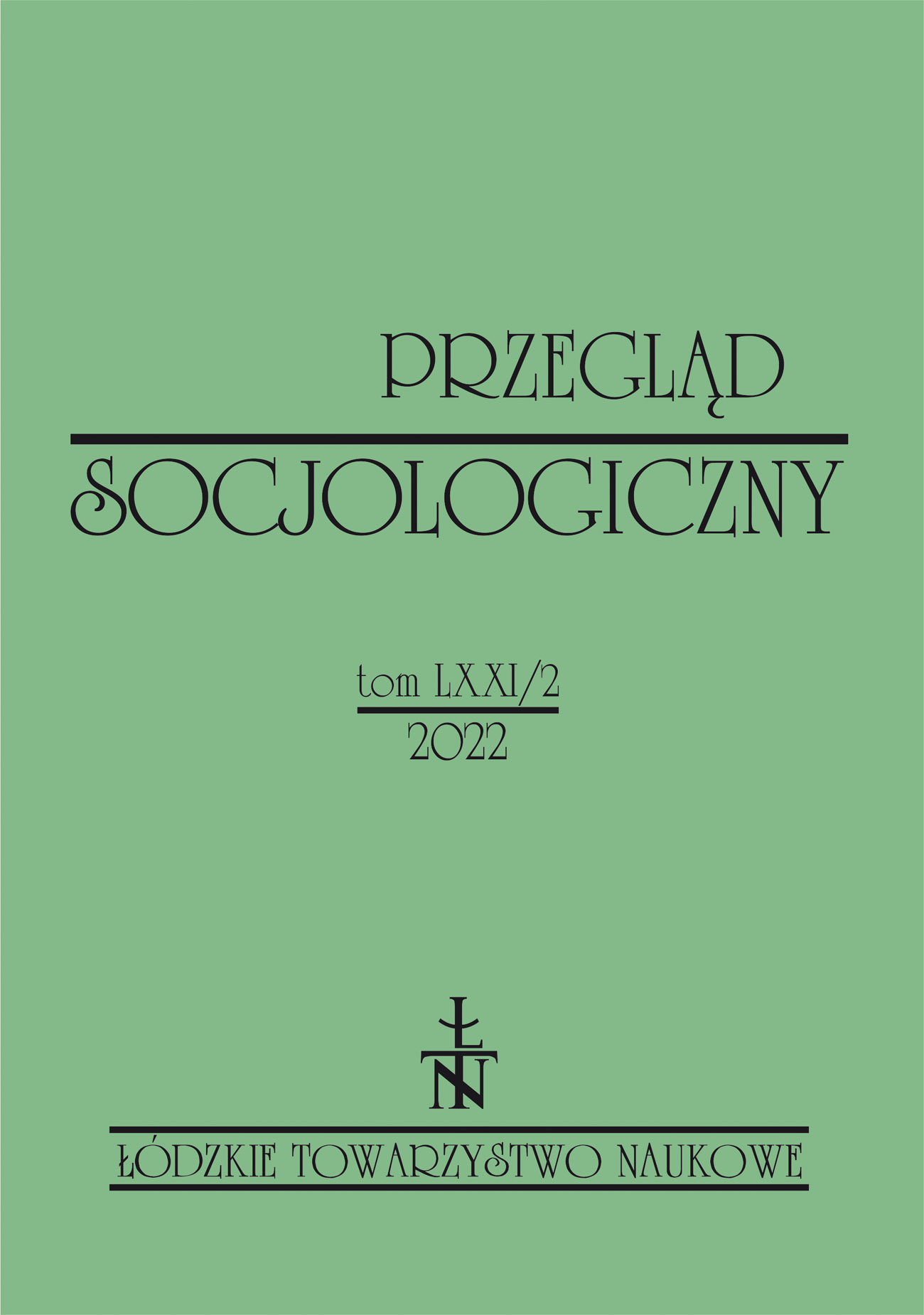Medical education and its influence on shaping professionalism and trust in the medical profession
DOI:
https://doi.org/10.26485/PS/2022/71.2/6Abstract
In the second half of the 20th century in the USA and Western Europe, representatives of science and the medical community noticed that the medical profession was experiencing a crisis. Due to the influence of various external factors (technology development, dependence on pharmaceutical companies) and internal factors (the desire to achieve high material status), doctors have begun to depart from the values that were important so far, which referred to the so-called traditional professionalism. All this contributed to a gradual decline in social confidence in doctors around the world. In order to counteract these negative tendencies, scientific research on medical professionalism was initiated in the West, and training for medical students in the field of professionalism was introduced. However, it was understood that professionalism cannot be taught to future doctors only during obligatory lectures (formal curriculum), the most important thing is to observe medical personnel who will present a professional attitude (informal curriculum) by their behaviour. The article deals with the issue of professionalism and its acquisition by medical students in the process of formal and informal undergraduate education, indicating that rebuilding professionalism may be the key to increasing public confidence in the medical profession. This process, however, is not easy because the pattern for current students are their older colleagues, who do not always present behaviours and attitudes considered professional. The article presents the results of the study conducted in 2020 on a group of 239 final-year students of the Faculty of Medicine at the Medical University of Lodz, regarding the assessment of their own medical education process and the assessment of the professionalism of their mentors, i.e. senior doctors.
References
ABIM Foundation, ACP-ASIM Foundation, European Federation of Internal Medicine. 2002. “Medical professionalism in the new millenium: A physician charter”. Annals of Internal Medicine 136(3): 243–246.
Apanowicz Jerzy. 2002. Metodologia ogólna. Gdynia: Wydawnictwo Diecezji Pelplińskiej „Bernardinum”.
Arnold Louise, George Thompson. 2010. Defining, teaching, and learning professionalism. In: Professionalism in medicine. A case-based guide for medical students, J. Spandorfer, C. Pohl, S.L. Rattner, T.J. Nasca (eds.), 7–21. Cambridge: Cambridge University Press.
Blendon Robert J., John M. Benson, Joachim O. Hero. 2014. “Public trust in physicians – U.S. medicine in international perspective”. New England Journal of Medicine 371(17): 1570–1572.
Calnan Michael, Rosemary Rowe. 2008. Trust matters in healthcare. Glasgow: Open University Press.
Castellani Brian, Frederic W. Hafferty. 2006. The complexities of medical professionalism. A preliminary investigation. In: Professionalism in medicine: Critical perspectives, D. Wear, J. Aultman (eds.), 3–24. New York: Springer.
Chapoulie Jean-Michel. 1987. “Everett C. Hughes and the development of fieldwork in sociology”. Journal of Contemporary Ethnography 15(3–4): 259–298.
Christakis Dimitri A., Chris Feudtner. 1997. “Temporary matters. The ethical consequences of transient social relationship in medical training”. Journal of American Medical Association 278(9): 739–743.
Cowell Richard N. 1972. The hidden curriculum. A theoretical framework and a pilot study. Cambridge: Harvard University.
Flinders David J., Nel Noddings, Stephen J. Thornton. 1986. “The null curriculum: Its theoretical basis and practical implications”. Curriculum Inquiry 16(1): 33–42.
Freidson Eliot. 1972. Profession of medicine. A study of the sociology of applied knowledge. New York: Dodd, Mead & Company.
Freidson Eliot. 1986. Professional powers. A study of the institutionalization of formal knowledge. Chicago: The University of Chicago Press.
Freidson Eliot. 2001. Professionalism. The third logic. Chicago: The University of Chicago Press.
Goold Susan D., Glenn Klipp. 2002. “Managed care members talk about trust”. Social Science and Medicine 54(6): 879–888.
Hafferty Frederic W. 1998. “Beyond curriculum reform: Confronting medicine’s hidden curriculum”. Academic Medicine 73(4): 403–407.
Hafferty Frederic W., Brian Castellani. 2009. The hidden curriculum. A theory of medical education. In: Handbook of the sociology of medical education, C. Brosnan, B.S. Turner (eds.), 15–35. London–New York: Routledge.
Hafferty Frederic W., Ronald Franks. 1994. “The hidden curriculum, ethics teaching, and the structure of medical education”. Academic Medicine 69(11): 861–871.
Haas Jack, William Shafir. 1982. “Ritual evaluation of competence. The hidden curriculum of professionalization in an innovative medical school program”. Work & Occupations 9(2): 131–154.
Hughes Everett C. 1971. The sociological eye. Sociological papers. New Brunswick: Transaction Publishers.
Janczukowicz Janusz. 2013. „Altruizm to za mało. Część 3: Standardy europejskie i światowe”. Medycyna po Dyplomie 22(2): 39–44.
Karta Lekarza. 2013. Medycyna Praktyczna dla Lekarzy, P. Gajewski, A. Juda, J. Mrukowicz, W. Strojny (tłum.). https://www.mp.pl/etyka/dokumenty/86822,karta-lekarza [dostęp: 17.03.2022].
Kilijanek-Cieślik Agnieszka. 2018. Raport Lekarze w badaniach opinii społecznej 2018, Ośrodek Studiów, Analiz i Informacji Naczelnej Izby Lekarskiej. https://nil.org.pl/uploaded_images/1575629945_raport-lekarze-w-badaniach-opinii-spolecznej-w-2018-roku.pdf [dostęp: 17.03.2022].
Łaska-Formejster Alicja. 2015. Pacjent w sieci zależności. Społeczny kontekst praw i autonomii pacjenta. Łódź: Wydawnictwo Uniwersytetu Łódzkiego.
Royal College of Physicians. 2005. “Doctors in society: Medical professionalism in a changing world”. Clinical Medicine 6(1): 7–12.
Rozporządzenie Ministra Nauki i Szkolnictwa Wyższego z dnia 26 lipca 2019 r. w sprawie standardów kształcenia przygotowującego do wykonywania zawodu lekarza, lekarza dentysty, farmaceuty, pielęgniarki, położnej, diagnosty laboratoryjnego, fizjoterapeuty i ratownika medycznego [Dz. U. z 2019 r., poz. 1573 z późn. zm.].
Scheele Fedde. 2012. “The art of medical education”. Facts. Views and Vision in Obstetrics and Gynaecology. 4(4): 266–269.
Studzińska-Pasieka Kinga. 2008. Profesja lekarska w społeczeństwie ryzyka biomedycznego. W: Zdrowie i choroba w społeczeństwie ryzyka biomedycznego, M. Gałuszka (red.), 140–179. Łódź: Uniwersytet Medyczny w Łodzi.
Szewczyk Kazimierz. 2018. „Kurs pozaformalny w edukacji moralnej studentów medycyny i młodych lekarzy, Diametros 57: 61–87.
Szewczyk Kazimierz. 2019. „Formy profesjonalizmu lekarskiego i ich przydatność w edukacji moralnej studentów medycyny i młodych lekarzy”. Diametros 16(62): 33–64.
Sztompka Piotr. 2007. Zaufanie. Fundament społeczeństwa. Kraków: Znak.
Tarrant Carolyn, Tim Stokes, Richard Baker. 2003. “Factors associated with patients’ trust in their general practitioner: A cross-sectional survey”. British Journal of General Practice 53(495): 798–800.
Zadoroznyj Maria. 2001. “Birth and the ‘reflexive consumer’: Trust, risk and medical dominance in obstetric encounters”. Journal of Sociology 37(2): 117–139.



